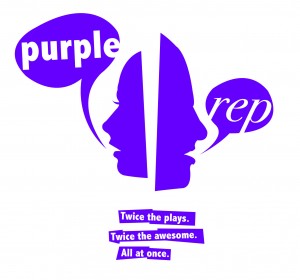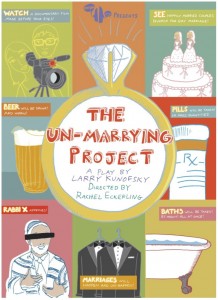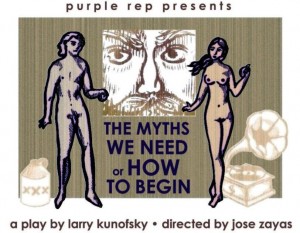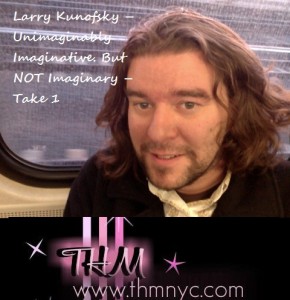You may think my life is all about going to shows, sitting in the dark, absorbing — going back home … writing reviews. It is NOT. My life is about highlighting, showcasing and celebrating the talented people of the independent entertainment world that I am lucky enough to experience. I only know how to do that one way: by knowing their work first, and then – if it works out – by meeting them for interviews, then seeing them socially … then interviewing them again. It helps when I can know the artist from the inside out – Know Them: Know Their Work. In turn: Know Their Work … Understand How To Distill It To An Audience. Voila - suddenly it’s all second nature.
Larry Kunofsky and I started out like any playwright/reviewer. But we soon learned that we had a lot to say to each other. A LOT. Larry is many things: a playwright, a thinker, a brilliant man. He’s as much an interviewer as an interviewee, and that’s what makes for a good give and take. In a few weeks The Management Theater Company will be doing his play Your Boyfriend May Be Imaginary. I had a lot to ask him. He had a lot to tell me. As a result I ended up with a two parter – and so did you, lucky reader. So, grab a drink and get ready to find out why New York City on a Saturday Night can be like falling down the rabbit hole, read why every relationship has an imaginary component to it, and, if Feist gets mentioned, play some of her music as you read. That’s what the link is for.
Love the title: Your Boyfriend May Be Imaginary.
Larry Kunofsky: Thanks, Karen. I won’t deny it, some of my titles are pretty nifty. I’ll let people like you speak to the merits of the plays themselves, but I hope that you and your readers will indulge me my little self-back-patting when it comes to Title-Pride.
If a play is sex, then a good title is foreplay. And if giving good foreplay is my legacy, I’ll accept my lot in life.
And we’re off!
Truthfully, Larry – How many imaginary boyfriends do you think are floating around out there? I bet in New York alone there are THOUSANDS. What’s your ballpark figure?
LK: I’ve never met any adult who has admitted to having an imaginary boyfriend or girlfriend. I think there are probably scores of undocumented cases of such things, but how would we quantify this? It’s kind of like trying to find out how many people cheat on their taxes.
Wait. Just got an idea for a play. An Internal Emotional Revenue Service that documents the love that we feel for others. A society in which intimacy is taxed. And your imaginary boyfriends need to be declared. That could be the next play… written by somebody else. That’s a terrible idea!
Frankly, I’ve heard worse.
LK: Your Boyfriend May Be Imaginary is not really about imaginary people. And in general, I’m much more interested in how we imagine our actual partners to be. Y’know what I mean?
No. Tell me more.
LK: Whenever friends talk to me about their partners, it always feels so intimate, since I will never see their partners the way that they do. And perhaps we never really know how our significant others talk about us, so we ourselves are always alien to the imaginary versions of us. And then – not that I’m conducting any kind of social experiment here, but it is something that I notice a lot – I find myself comparing my firsthand knowledge of the boyfriend or girlfriend or Otherfriend in question to the version of this same person as described to me by their partners. This can often create a fascinating disconnect.
I think that even the most aware and truthful and pragmatic of lovers can’t help but impose their own meaning of their partners onto their actual partners. So, in essence, all our boyfriends and girlfriends and friends in general are imaginary, because we sometimes see the idealized version of them, and sometimes (maybe when we’re cranky and having arguments in the middle of the street; although I’ve never been party to such base behavior) we see our partners in the most hypercritical and uncomplimentary ways.
But the key to any adult relationship is getting to know the other person beyond our own perspective. It’s a yin-and-yang thing. You need to split the difference between how you see the one you love and how the one you love sees her-/himself. To love and to be loved in any meaningful way involves factoring in all these versions of one another and striving towards our most truthful selves.
I think I was putting something together there, but it all fell apart like Jenga. My brain just slapped me in the face.
No no … it stuck. Not every Jenga brick fell to the ground. Okay. So, theoretically, everyone is imaginary when they’re being thought of more highly than they are, or demonized somehow … the real person is somewhere in the middle of the huge pendulum swing. I got it.
 So then, what’s going on here then? What makes everyone suspicious that this boyfriend may be imaginary? Tell me a little bit about this play and what made you write it.
So then, what’s going on here then? What makes everyone suspicious that this boyfriend may be imaginary? Tell me a little bit about this play and what made you write it.
LK: Ah, now I can just plug the bejeebus out of this play!
Great!
You’re Welcome, The Management!
Thanks, Karen – you’re good.
Okay.
“It’s a busy, happening Saturday night in the Big City, and everyone we know is having a party in their apartment. Apartments! Parties! People! Music! Dancing! Cell Phones! Flashbulbs! Making Out! Longing.”
Those are the opening stage directions for the script of Your Boyfriend May Be Imaginary.
We’re following Marci, a woman of good character but of low standing in the society and mini-societies within this play, as she goes from party after party looking for her missing boyfriend, or at the very least, some information that would lead her to find her boyfriend.
It’s kind of like Alice in Wonderland, if Alice were an adult, had a boyfriend, couldn’t find him, and jumped into the Rabbit Hole that is all the parties that people are having in the Big City on a happening Saturday night.
I love that.
LK: Everyone Marci encounters apologizes to her for being so busy and so out of touch. At first it seems that Marci has failed to connect with the other people in her life, but along her search, we see that everyone around her is failing and failing again to connect with anyone and everyone.
And the more Marci enquires into the whereabouts of this boyfriend that no one has ever met, the more people suspect that Marci doesn’t really have a boyfriend.
And so not only does Marci need to find her boyfriend, she has to find someone who believes her, or believes in her. And the more “clues” that she discovers about her missing boyfriend, the more Marci realizes that she’s not only looking for where her boyfriend is, but also, and even more importantly, who her boyfriend is. And these questions make her wonder who she, herself is, and where she is right now, within her own life.
It’s funny.
It’s sad.
It has mysteries and discoveries.
It has love between boyfriends and girlfriends, and it also has love within relationships that we don’t even have names for yet.
That’s Your Boyfriend May Be Imaginary.
Thank you for asking.
Really.
I’m so proud of The Management and the phenomenal ensemble for this production.
When I hear “your boyfriend may be imaginary” to me, that’s a very different subtext than “You’re lying! You don’t have a boyfriend!” It’s actually very gentle, cautious … like you’re approaching the person with a comfy blanket and some cocoa, hoping not to disturb the fantasy. Am I wrong? Are the people in this play warm, fuzzy blanket people trying to help, or are they those buzz kills just trying to be balloon poppers?
LK: This question speaks so much to my philosophy on how to be a real friend.
My mother always used to say, whenever anyone screwed up or said or did something stupid: “They mean well.” And the older I get, the more I do appreciate good intentions, and I really do see her point as deeply compassionate and forgiving.
But I also can’t deny that I find the well intentioned among us to be somewhat oppressive when they try to help us in the way they think we need to be helped (or loved, or treated in general), rather than in the way that we want them or need them to. It’s like asking someone for the time, and they give you instructions on how to build a watch.
Ha!
LK: So this is a play about someone who needs something very specific from people, but who is mostly given the other person’s version of what they think she needs, rather than what she’s asking for.
And Marci, our heroine, seems to have a long history of not getting what she really needs from people. But since she needs to find her boyfriend, she forces herself to ask others for help. The fact that most people in Marci’s life don’t help her is (I think) among the funniest and most poignant aspects of the play, but the ultimate challenge for Marci is to allow others to help her in their way until she can find someone who can help her in her way. And I think that’s a challenge for all of us. Often what people give us is not really what we need from them, but it helps if you accept what people give you, just the same. At least some of the time. Because, like my mom says, “they mean well.”
 There’s a song on Feist’s latest album that goes “When you comfort me / It doesn’t bring me comfort, actually.”
There’s a song on Feist’s latest album that goes “When you comfort me / It doesn’t bring me comfort, actually.”
And I suspect that the subtext of this song is that the First Person Narrator is missing out on something profound.
My theory is that this person (and I somehow cannot accept that Feist is singing about herself here. I’m not entirely sure why, but I have a lot of strong feelings about Feist in general, so bear with me) refuses to face the challenge of being comforted.
Perhaps how we expect or want to be comforted is too complacent, and we have to get past an outmoded comfort zone in order to find true comfort.
Isn’t that a fascinating paradox? (It is.) Do you have Feist’s email address? (I don’t.) She needs to know about this right away! (Maybe she’s reading this …? Possibly? We have a lot of readers !)
The main characters in my plays are usually so put-upon in their struggles for basic kindness, intimacy, understanding, that this struggle (which I admit, seems on the surface to be common and ordinary) is, in itself, heroic.
It’s my way of turning the mundane into an Epic Quest. Because I always find the struggles of someone as seemingly ordinary as Marci in her search for her boyfriend to be far more compelling than someone like Sir Galahad searching for the Holy Grail. That’s just how I’m wired.
By the end of the play (Spoiler Alert: This is NOT a Spoiler!) Marci finds someone she can help and from whom she learns to accept help and comfort and intimacy and companionship in return.
Wow, that sounds really nice!
I was going to say that Larry. So I will: That sounds really nice!
LK: Not all of my plays have happy endings.
This play has a lot of happiness in it. But I think people will cry at the end.
Maybe that makes me sound like I think I’m All-That-and-a-bag-of-chips (as if! Wait, who am I right now? I don’t really talk like this!), (You don’t. But you’re on a roll. ) but when I see the lovely actors in this powerful ensemble really BRINGING IT in rehearsals, I get a little verklempt myself.
So bring a hankie to Under St. Marks.
But the good thing is, it’s a Happy Cry.
And sometimes we all need a good Happy Cry.
Sometimes? I need a good Happy Cry every other Thursday. So, looks like I can put away my Barry Manilow Somewhere Down The Road 45 the week I’m going to see your show.
Okay. Moving on.
I’ve seen 2 of your plays so far: The Myths We Need – or – How To Begin and The Un-Marrying Project. On the surface both those plays were acres away from each other in terms of theme, but at the heart of it the pulse that drew the audience in was the 1:1 relationship between two people be it man and woman, man and man or woman and woman. So, would you say that Your Boyfriend May Be Imaginary is similar?
Meaning – probably looks and feels different from your other works but has the same heart?
LK: This question makes me reflect deeply on the past year, Karen.
I haven’t known you all that long (even though we’ve become fast friends; a phenomenon that should happen more often between playwrights and reviewers! I mean, it’s one thing to give your friend’s work a good review, but it’s another to become good friends with someone whose work you respect and admire. And on the other end of that equation, it’s easy for me to let you in on my creative process, because I actually like talking to you and hanging out with you), but Boyfriend will be the third play of mine produced in NYC within a single year.
That’s very rare. I’m not sure I’ll be so privileged again anytime soon.
This fills me with both pride and humility.
 I have some anxiety about the future of Purple Rep, my theatre company, and I also have some anxiety about finding more opportunities for myself as a playwright beyond my own company (and beyond New York City, for that matter).
I have some anxiety about the future of Purple Rep, my theatre company, and I also have some anxiety about finding more opportunities for myself as a playwright beyond my own company (and beyond New York City, for that matter).
But ultimately, when you’ve collaborated with the kind of talented people I’ve worked with this past year, you get really hungry for that kind of work and for those kinds of working relationships.
It freaks me out a little (not knowing where my next creative “meal” is coming from), but it also helps me focus on working for what I know will feed me, creatively – keeps my head in the game.
Maybe that was a bit of a tangent, but it was worth reflecting upon.
These three plays are a good cross-section of the kind of work that I do as a playwright.
 The Un-Marrying Project plays with form (is it a film or a play or a film-within-a-play?) and is among the most politically engaged of my plays (it deals with the fight for Marriage Equality. And now it’s a “period piece,” at least in New York, but I feel that this play continues to be relevant in the questions it asks about political activism itself (particularly now, in the age of the Occupy movement), as well as the questions that the play asks of us beyond politics, as in: What does it mean to be together with someone? What does it mean to separate from someone you’ve been with for a long time? When the obstacles against connection with others are external, how does this change our internal harmony with others? And what happens when we do get what we want, politically, artistically, romantically?
The Un-Marrying Project plays with form (is it a film or a play or a film-within-a-play?) and is among the most politically engaged of my plays (it deals with the fight for Marriage Equality. And now it’s a “period piece,” at least in New York, but I feel that this play continues to be relevant in the questions it asks about political activism itself (particularly now, in the age of the Occupy movement), as well as the questions that the play asks of us beyond politics, as in: What does it mean to be together with someone? What does it mean to separate from someone you’ve been with for a long time? When the obstacles against connection with others are external, how does this change our internal harmony with others? And what happens when we do get what we want, politically, artistically, romantically?
The Myths We Need – or – How To Begin plays with language. It’s written in something I like to call Ole Timey Talk. And it’s part of my cycle of biblical plays, The Genesis Tapestries, which dramatizes, reinterprets, and sometimes challenges themes from the Old Testament. The plays in this cycle might seem, on the surface, to be my least personal, since they take place in different times and places than where I am in my own life, but in many ways this long-term, ongoing project comprises my most personal work, in that I’m stretching the canvas, painting in broad strokes, and seeing how these ancient stories and themes reflect my own life, and vice versa.
Your Boyfriend May Be Imaginary might seem to be the most conventional of these three plays. It has some social satire in it, but it’s basically a character-driven comedy. It’s probably most similar to my play What To Do When You Hate All Your Friends – an anti-social comedy then any of my other work. (Both plays have a bunch of parties in them, and both plays deal with the weird hierarchies we place on our friendships, relationships, and social circles), but it does play with form (more on that later), and may not be political in any way, but does ask questions about how we as individuals interact within our community, and it does play with language, in that everyone speaks in this play in what I call Bi-Polar Speak, all run-on speech, and breathless syntactical (il)logic, but ultimately, all these plays are about how we love.
We all love. And we all love differently. And in many ways we all love badly. Or, at best, we don’t love enough, or we don’t love well enough. But there is hope that we can love better. That is, in essence, what I am always, always, always writing about.
That was the long answer to your question.
Here is the short answer:
Yes.
~~~
Can’t get enough of Larry Kunofsky? Neither can I. That was part 1. Part 2 is coming up soon. It’s just as funny, thoughtful, moving and minxy as this was. So … grab another drink, stay tuned, and get ready for more of the same (but completely different)!
_________________________________________________________________________










{ 0 comments… add one now }